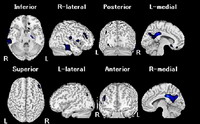Treatment of Alzheimer's disease by new drug to be possible in several years
German scientists from the Max Planck Institute of Molecular Cell Biology and Genetics in Dresden believe that they have created a drug that when injected into the brains of mice with Alzheimer's disease reversed signs of the disease.

The drug is said to effectively block the enzyme responsible for the build up of sticky deposits or plaque in the brain, attaching itself to the spot where toxic activity takes place. Still it is not known whether current treatments slow the progression, or simply manage the symptoms. Many preventative measures have been suggested for Alzheimer's disease, but their value is unproven in reducing the course and severity of the disease.
Scientists predict that already in 2 years the drug may be available for use by patients. Here appears a certain obstacle – oral medicine or standard injection has to overcome the natural barrier protecting the brain from chemicals in the blood.
Now scientists are working at a special compound to anchor an inhibitor of the enzyme beta-secretase to cell membranes.
Alzheimer's disease is the most common cause of dementia, afflicting 24 million people worldwide. Alzheimer's is a degenerative and terminal disease for which there is currently no known cure. In its most common form, it occurs in people over 65 years old although a less-prevalent early-onset form also exists.
The disease can begin many years before it is eventually diagnosed. In its early stages, short-term memory loss is the most common symptom, often initially thought to be caused by aging or stress by the sufferer. Later symptoms include confusion, anger, mood swings, language breakdown, long-term memory loss, and the general withdrawal of the sufferer as his or her senses decline. Gradually the sufferer loses minor, and then major bodily functions, until death occurs. Although the symptoms are common, each individual experiences the symptoms in unique ways.
Four medications are currently approved to treat the cognitive manifestations of AD by regulatory agencies, including the U.S. Food and Drug Administration (FDA) and the European Medicines Agency (EMEA). Three are acetylcholinesterase inhibitors and the other is memantine, an NMDA receptor antagonist. No drug has an indication for delaying or halting the progression of the disease.
Photo: www.med.kobe-u.ac.jp
Subscribe to Pravda.Ru Telegram channel, Facebook, RSS!




